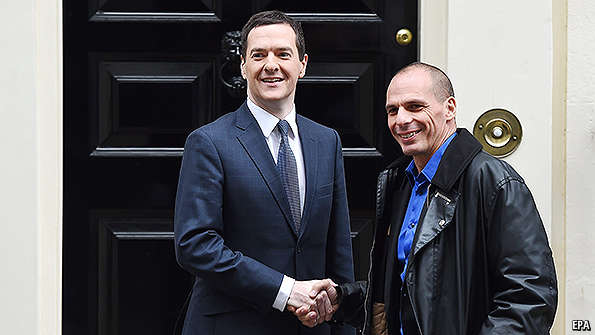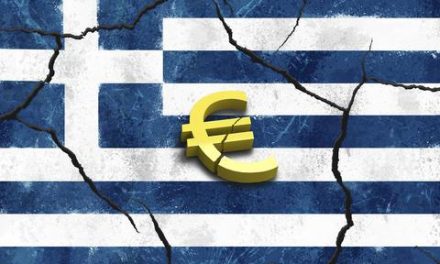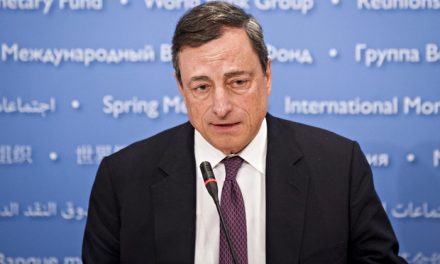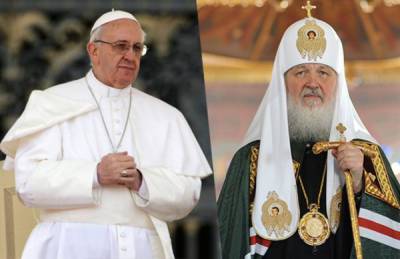Greece tries to win concessions from European governments, but the European Central Bank is the biggest factor of all
The Economist
IT HAS certainly been a rocky start. In its first week in office, Greece’s new government pledged to row back reforms, halt privatisations and to ignore calls for an extension to its second bail-out programme, which expires at the end of February. The announcements sent share prices of Greek banks tumbling, and hastened a worrisome flow of euros out of the country. Athens even triggered a brief, if exaggerated, flurry of concern in Brussels that it might seek to disrupt the European Union’s Russia policy. This week the charm offensive begins: Alexis Tsipras, the new prime minister, and his finance minister, Yanis Varoufakis, are touring European capitals to make their case for a new deal for Greece.
Monday found Mr Varoufakis in London for a meeting with George Osborne, chancellor of the exchequer (pictured). Mr Osborne termed the Greek standoff “the greatest risk to the global economy”, and called for Athens to act responsibly but also for the EU to devise a better plan for growth. In Berlin, in contrast, the rhetoric has been hardening. On Friday Angela Merkel, Germany’s chancellor, confirmed what everyone knew: that she would countenance no cancellation of Greek’s public debt, most of which is owed to European institutions and governments. This followed a bad-tempered meeting in Athens at which Jeroen Dijsselboem, head of the Eurogroup of finance ministers, told Mr Varoufakis to forget his idea of a grand “debt conference” to discuss such ideas.
Mr Varoufakis met a friendlier reception in Paris on Sunday, where the Socialist government’s finance minister, Michel Sapin, said France was “more than willing” to support Athens, and even called for a “new contract between Greece and its partners”. Nonetheless, the weekend’s most significant intervention belonged to Erkki Liikanen, head of Finland’s central bank. On Saturday Mr Liikanen, who sits on the governing council of the European Central Bank, confirmed that if Greece were no longer in a bail-out programme, the ECB would no longer accept its government’s junk-rated bonds as collateral. That would cut off Greek banks, already facing an accelerating outflow of deposits, from ECB liquidity assistance.
As so often before, the ECB is emerging as the crucial player in the latest chapter of the euro zone’s debt crisis. Even if Greece did leave its bail-out the bank could continue to provide its banks with a separate form of help known as Emergency Liquidity Assistance (ELA). But there are no guarantees. If two-thirds of its governing council voted to stop ELA, that could trigger a chain of events resulting in capital controls and Greece being forced out of the euro: an outcome that everyone claims to want to avoid.
The ECB, says a euro-zone insider, is thoroughly sick of Greece, and will certainly not bend the rules to accommodate it. But neither does the bank, an unelected body, want the burden of determining the deeply political question of whether or not Greece should stay in the euro. It is a safe bet that the ECB’s president, Mario Draghi, will be pushing the two sides towards some sort of accommodation—sooner rather than later.
That is because time is not on Greece’s side. It faces various bond repayments in March and more in the summer. Officials say it can fund itself until June at the latest, by which time it will need further help—probably in the form of yet another bail-out. But that does not address the banking problem.
It is still possible to make an optimistic case for Greece’s continued membership. Although Syriza has called for “the greater part” of its whopping public-debt pile, worth over 175% of GDP, to be written off, Mr Tsipras has also indicated that there will be no unilateral attempt to stiff creditors. For their part, the Germans and others could not have been clearer that haircuts are not on the cards. A further extension of debt maturities, though, may be, as well as a cut on the interest rates of some loans.
What else? A relaxation of the requirement that Greece run a primary surplus worth 4.5% of GDP from 2016 has not been ruled out. Securing that would allow Mr Tsipras the fiscal space to enact some of the spending promises he made on the campaign trail. And euro-zone officials have hinted that they may be willing to adjust or even replace the “troika”—the ECB, European Commission and IMF—that oversees bail-outs and that has been the target of much Greek rage. If Mr Tsipras accepts a third bail-out in a few months but can tell voters that he has seen off the troika, enough face may be saved on all sides to allow de-escalation. Before that, though, Greece must find a way to stay afloat if, at the end of the month, it finds itself set adrift for the first time in five years.



















